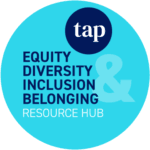Inclusion means everyone is valued.
An inclusive workplace is a place of acceptance where a shared sense of belonging helps all individuals achieve their highest potential and realize the organization’s long term vision.
Inclusion requires removal of barriers, whether attitudinal, structural, or societal, to allow the full and equal participation of all individuals in an organization. Removing barriers could require adjustments to policies, environments, and organizational cultures, as well as fostering open communication with employees.

Business Case
Equity, diversity, inclusion and belonging are proven to improve business outcomes. From boosting productivity and morale to increasing profits and innovation, diverse teams perform better. Presenting leaders with the business case for EDI&B often…
Leadership
The most successful EDI&B initiatives are led by an organization’s leadership team. Clear support from leadership lends credibility and authority to any program. Through their influence and mentorship, leaders are key drivers of an inclusive culture.


Employee Engagement
Employers can support the passion, commitment, and effort employees put into their work through engagement activities. Effective management practices, curated benefits, and equal opportunities help keep staff motivated and engaged.
Policies
Policies are an articulated system of principles that guide decisions and reach goals in the workplace. Inclusive policies can provide a strong foundation and safe environment for your organization’s journey towards best practices on EDI&B.


Legislation
Federal and provincial governments have put many different laws in place to promote equality and equity. At minimum, businesses are required to uphold these laws and ensure they have non-discriminatory practices.
Measurement and Benchmarking
If you measure it, you can manage it! Tracking progress from your starting point and creating goalposts along the way, allows your organization to measure its success on EDI&B and make informed decisions on where to go next.


